South Africa: Beyond Braais and Biltong
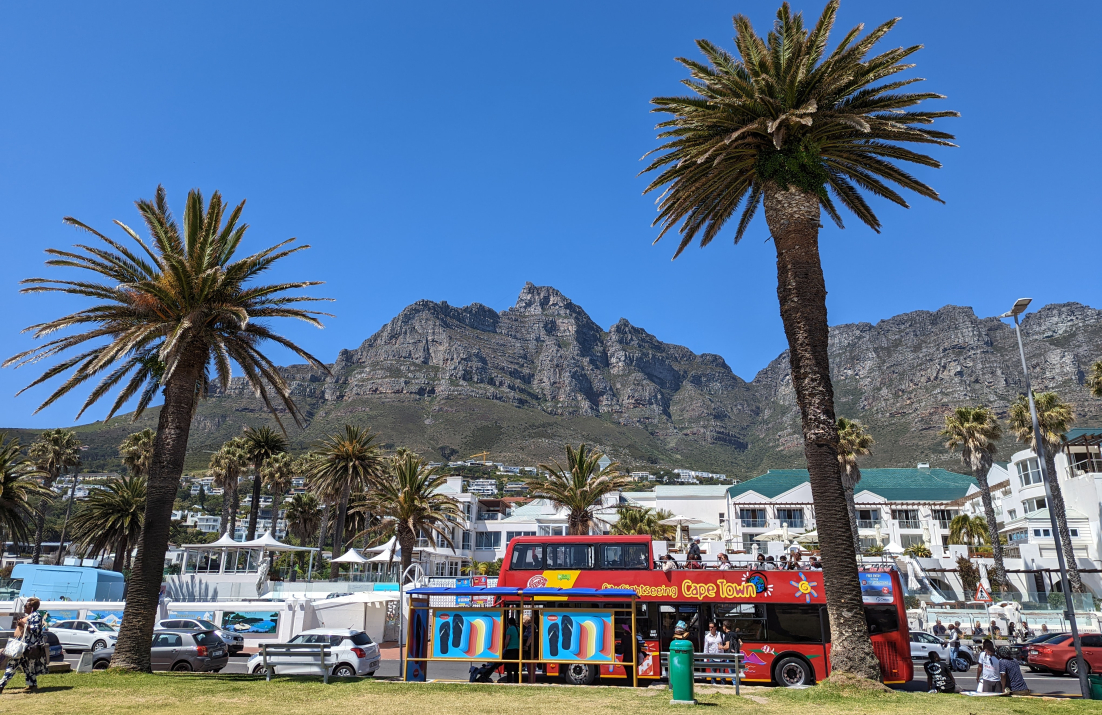
A country offering delicious wine paired with amazing people... In light of our new South African wines arriving in the UK we thought we would share more of the journey that led to their discovery, which all started when we went to South Africa in October.
Day One: Saturday 1st October
We landed in Cape Town at 11.15am after an over-night flight from London and luckily no fear of jet lag with only an hour time difference. So we were well-rested and made our way to a supermarket to pick up a quick snack of Simba chips before starting our first drive to Stellenbosch. Our first visit was to Ladybird Vineyards where we met Francois van Zyl who we have been working with for a long time as he has supplied us with the wonderful wines from ‘Laibach’ now known as Ladybird. Based in the Simonsberg-Stellenbosch with deep red soils and cooling maritime winds from False Bay, they choose to make big complex wines with minimal intervention and organic methods.
We were taken for a tour around the vineyards, followed by a tasting with Kanonkop who have recently taken over Ladybird Vineyards with their own vineyards just across the road. The name Kanonkop is derived from a hillock (kop) on the Simonsberg mountain above the wine estate from where, during the 17th and 18th centuries, a cannon (kanon) was fired to announce the arrival of sailing ships entering Table Bay.
We had a lovely evening watching the sunset with our hosts, drinking wine and nibbling on biltong, the staple dried spiced meat, as they cooked lamb on the Braai (a traditional South African barbeque). Drinking South African wine in the true South African way was a great start to the trip. We enjoyed a picturesque stay at the Ladybird accommodation with a great view of the starry sky.
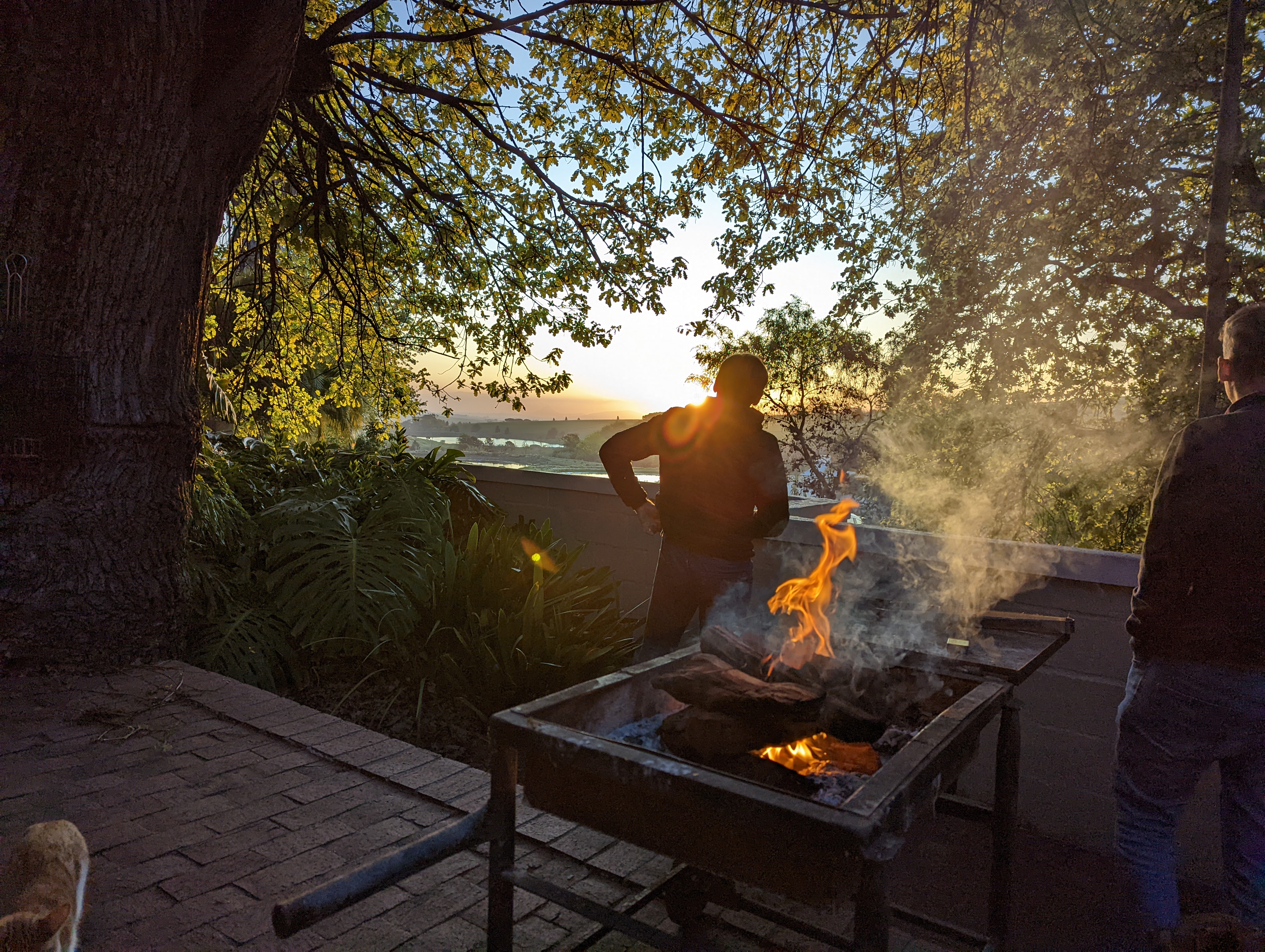
Day Two: Sunday 2nd October
Before making our next stop, we decided to take a detour to the coast at De Kelders so that we could see the whales who come to Cape Agulhas every year to give birth. We enjoyed visiting the ancient caves and saw a glimpse of the whales which came so close to the rocky bay, though sadly it was not quite the stunning HD quality of a David Attenborough documentary but, an amazing sight to witness nevertheless.
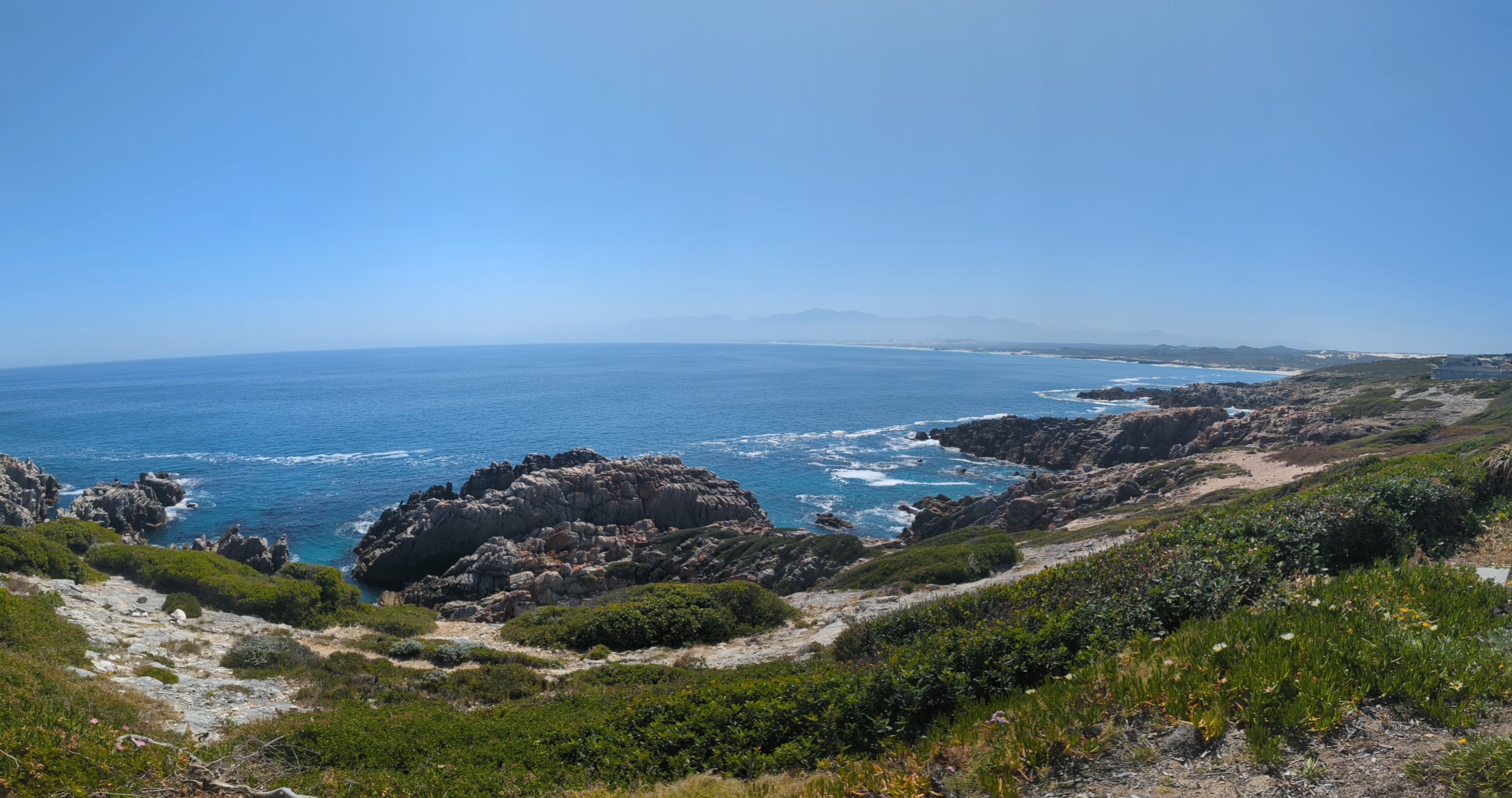
We then drove into what felt like the middle of nowhere as we turned onto a dirt track to eventually arrive at Strandveld. As we drove in, we saw a massive whale bone on display and the beautiful garden showcasing South African plants in Spring. Their vineyards were beautiful, albeit wind-swept, located in the Elim ward 9km from the sea. Situated between Elim and Cape Agulhas, it is the southernmost winery on the continent of Africa. Constant gusts of Atlantic Sea wind contribute to a relatively cooler climate and keeps the grapes dry, preventing disease but also extending the ripening periods and consequently keeping the yields low for greater quality. Red and yellow Ferricrete dominate on cooler, south facing slopes for heat sensitive cultivars like Sauvignon Blanc, while a single block of white quartzite gravel soil is used to produce the grapes for their quality Syrah.
We were greeted by our hosts Shaun McVey and Winemaker Conrad Vlok as we tasted through the range. This was no ordinary tasting as it was accompanied by dishes cooked by Conrad himself starting with Sea Snail, then onto locally grown asparagus, Mussel and Mussel Cracker in a spicy tomato sauce and finally Springbok with mushroom sauce and a light fruity salad. For dessert we were treated to a coconut covered date and a couple of chocolates. The long tasting and meal was broken up by a bumpy drive to the vineyard as we stepped out into the wind to see the scenic vineyards and detoured to a more sheltered escape from the wind by the small reservoir where we enjoyed some wine to watch the sunset. A wonderful candle-lit evening (due to the load shedding which meant power outages for a few hours), hosted by Conrad the winemaker whose first language is Africaans and yet you wouldn’t know it except for the few funny idioms he couldn’t quite translate into English. The load shedding in South Africa has created many challenges for winemakers, although they often know the schedule for when the power will go out, it can often be for very long periods of the day making simple tasks difficult. Many have turned to backup generators to help, although this has a cost.
Day Three: Monday 3rd October
We then made our way to Franschhoek where we met our new supplier Black Elephant Vintners. We walked through the winery and stepped into the rock’n’roll style tasting room, greeted by a very loud parrot. The room was covered in rock’n’roll wine artwork, a real shift from traditional tasting spaces yet inspired their ideology of making wine fun as true ‘rebels of the vine’. They experiment with new ways to engage consumers such as with wine tasting and vinyl evenings where individuals listen to music that is paired with the wine, cake and wine tastings and silent discos. We tasted through the range and talked about their quirky labels and names such as ‘Two Dogs A Peacock & A Horse’. They are breaking trends to stand out from the crowd as ‘Misfits of the Wine Industry’!
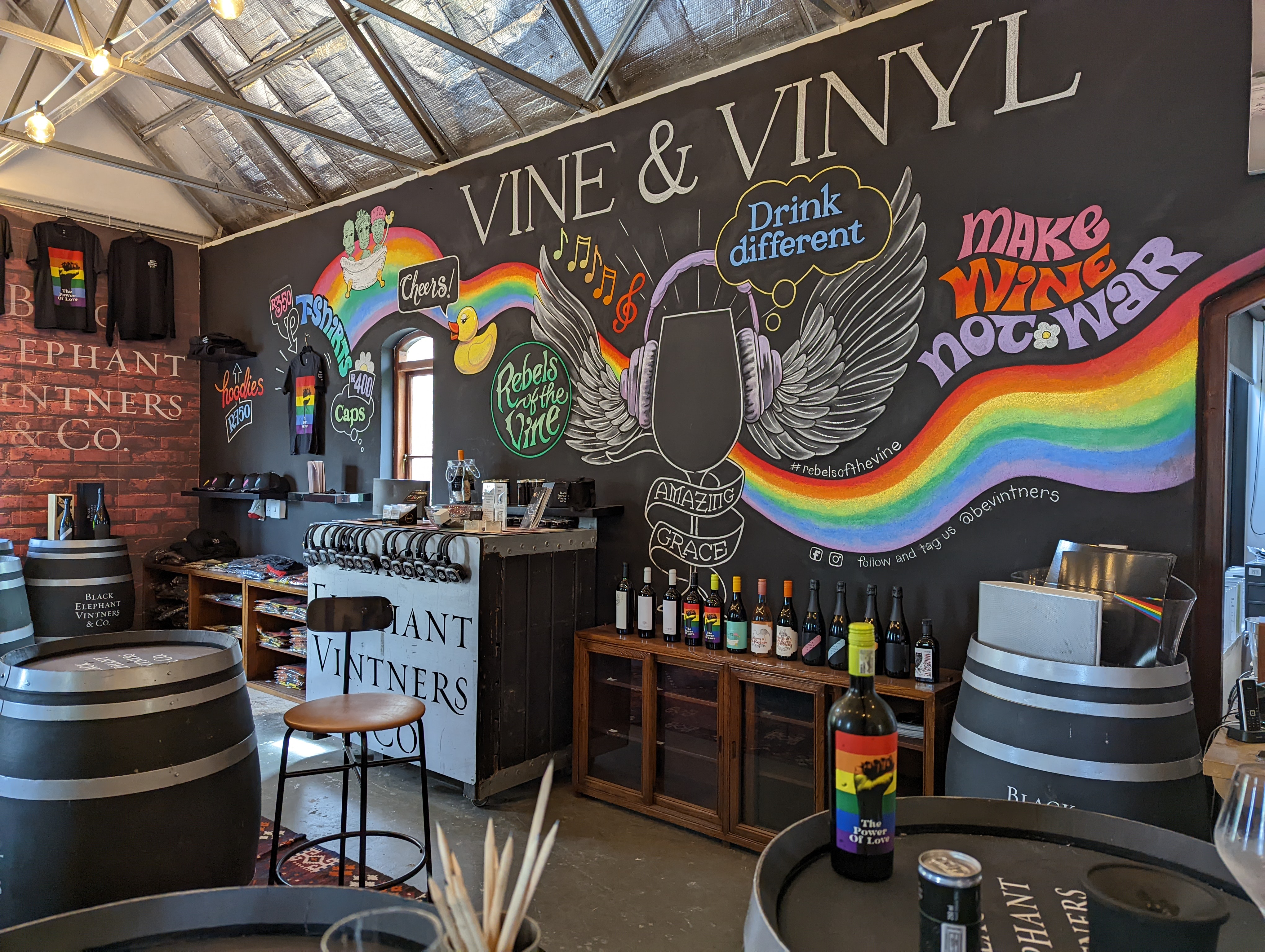
We then went to visit our existing producer Villiersdorp, who make our South African wines which we get bottled in the UK, and we saw the massive scale at which they work. We were treated to a lovely platter lunch with a beautiful view of the surrounding mountains. Sadly, we couldn’t see Christo the Head Winemaker but we were in good hands as we were tasted through the wine range and finished with the Baboon – their take on Jägermeister!
Franschhoek is surrounded on three sides by mountains giving shelter and warmth and a variety of sites for vineyards resulting in an undeniably beautiful landscape to overlook. We had dinner in Franschhoek which has French heritage from when it was founded by the French Huguenots in 1687 and has since become a centre of quality wine and dining. We dined in a French bistro and treated ourselves to beautifully cooked steaks accompanied by the famous Chocolate Block wine.
Day Four: Tuesday 4th October
We made our way to Org de Rac in Swartland which was a really special visit as we could see the scale and quality of the grape growing and winemaking. They provide us with our delightful Renosterbos wine which is named after a small shrub indigenous to South Africa and inspired the captivating label designed by our very own Designer. We were taken round by Johan Gerber who showed us their organic practices such as the worm farm where they utilise worm pee to manage mildew. Org de Rac was one of the first wine farms in South Africa committed to 100% certified organic wine-farming. South Africa is increasingly becoming more focused on organic practices so we are excited to see great progress from winemakers such as Org de Rac. Its vineyards are south-facing and grow in isolation, fanned by the cooling westerly breezes of the icy Atlantic Ocean situated 50km away and so it has not ever used fertilisers and pesticides from a lab. Instead, they use natural compost and sea-bird manure, as well as crop-covers which fertilize the soils, creating a natural environment for vineyards to flourish and ensuring optimum health. We also saw a few Buffalo and Sheep along the way as the producer encourage surrounding life such as ladybirds and earthworms along with mammals. We then further saw the organic practices within the winery with Winemaker Lizelle Gerber and tasted through the selection of wines comparing two vintages to see the impact and improvement of their winemaking. We were then treated to a beautiful buffet outside with the view where we enjoyed a true South African example of a salad which consisted of mainly meat and a dusting of cucumber and tomatoes. Lizelle jested that chicken is a South African salad.
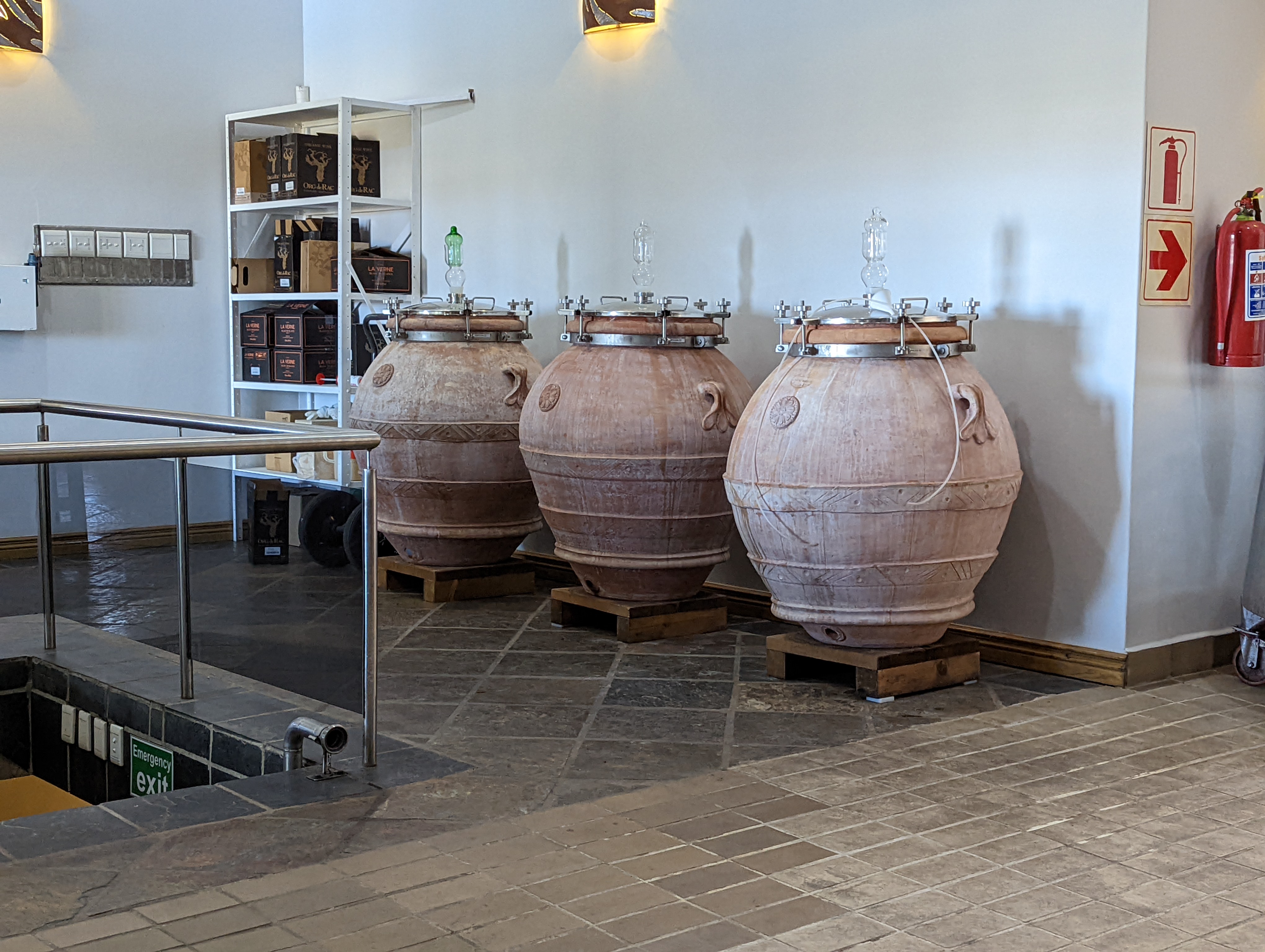
We then made our way to visit our new supplier for Frank Wines which we are excited to introduce to our range. Cape Wine Company was founded in 2010 by Erlank Erasmus – qualified winemaker – on a quest to share the exceptional wines produced in the Cape Winelands of South Africa – with wine lovers across the world. The bold labels of Frank are striking and sophisticated with a simple message – Let’s be frank about wine, keeping the language simple and approachable for consumers. But it is more than just wine as they are fairtrade and vegan friendly, proving that they go beyond to ensure quality and fairness. We decided to venture into Stellenbosch for dinner, the business and educational hub of South Africa. We enjoyed a nice dinner and drinks, finishing the evening with wine by the fireplace.
Day Five and Six: Wednesday/Thursday 5th-6th October
We returned to Cape Town ready for the Cape Wine Fair which has been much anticipated. The event last took place in 2018, usually taking place every 3 years, yet was delayed due to covid. The large halls of the Cape Town International Conference Centre were packed with producers from all over South Africa showcasing their wines. We walked through and discovered a huge range of styles of wines and winemakers. We also met with multiple prospective suppliers and enjoyed seeing familiar faces of De Wetshof. We were very excited to meet with our new producer Ses’ Fikile (translating to mean ‘We have Arrived’) and tasted the two new wines we are introducing: a Chenin Blanc-Roussanne blend and Shiraz-Cinsault blend. We also talked about the cultural stigmas Nondumiso has overcome and is working to change, such as encouraging better education about alcohol in the community and wine pairing with traditional African food. We were intrigued by her work with schools to educate young people about winemaking and we are excited to see the amazing things she continues to do. We finished the wine fair on a sweet note as we tasted the beautiful Vin de Constance leaving us speechless!
Our last two evenings in Cape Town included – no surprise – more steak and delicious cocktails at Waterfront, a social hub for entertainment, shopping and food. The next evening was at a traditional South African restaurant with loud musicians playing their own take on well-known songs, creating a fantastic vibe and fun entertainment. We enjoyed a meat platter with fillets of Kudu, Springbok and Ostrich and one member of the team even trying Crocodile Carpaccio!
Day Seven: Friday 7th October
After the fair, we chose to take some time to enjoy as tourists before making our way to the airport to head home. We took the tour bus round the city, seeing Table Mountain (though not quite taking the trip up as it was a 2-hour long queue) and then went to Camps Bay Beach, a beautiful white sandy beach with palm trees blowing in the wind, however not a soul in the ocean which we quickly discovered why as we walked by the sign showing the various types of Shark that could be found! Here, we enjoyed a meal with a view and quite possibly the best Chicken Burger I have ever had. Our bus took us back round the coastline revealing the hot spots for various celebrities to stay as it is protected by the cold winds and yet with stunning views of the shore. Finally, we made our way back to the airport before taking the overnight flight leaving South Africa in the early days of Spring and arriving back to chilly London in the midst of Autumn.
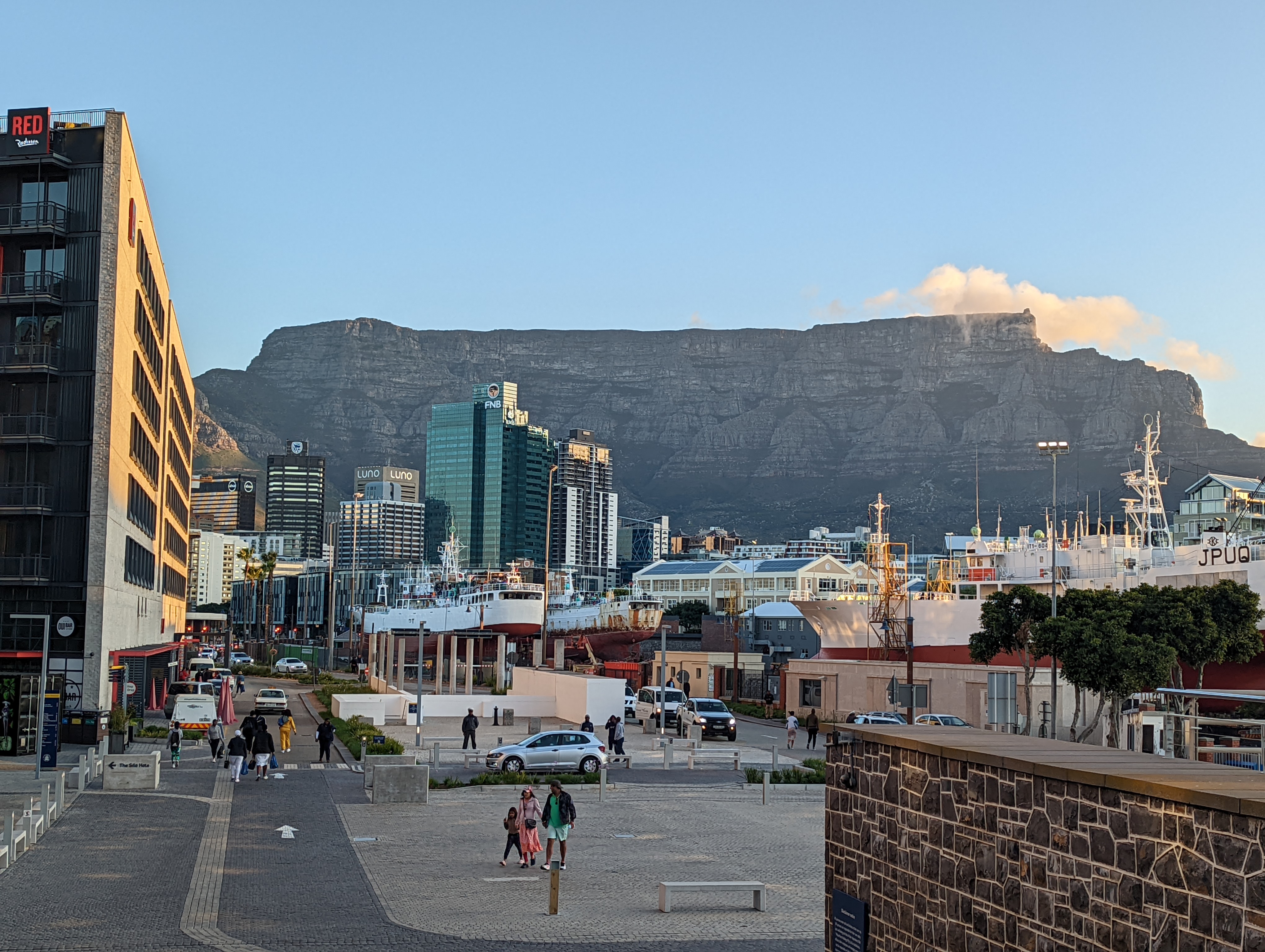
We are also excited about a few more additions to our South African range such as Alvi’s Drift, Doolhof and Angus Paul.
Angus Paul had their first vintage in 2020, creating wines with a focus on South African Heritage, using Chenin, Muscat and Pinotage soon expanding with Cinsault. The wines are made with minimal intervention to make quality wines that truly express the varieties characteristics. The labels are inspired by the ‘Age of exploration’ when the South African wine industry was founded, with graphics of superstitious tales from exploratory sailors.
The Alvi’s Drift estate, based in the Breede River valley, is named after a bridge that was built across the river, which was commissioned in 1928 by the family as a means for the locals to cross safely. The estates founder Albertus Viljoen ‘Oupa Alvi’ notoriously scored the Springboks first try against the All Blacks on African soil. Today, his grandson Alvi van der Merwe is the winemaker and long side the vineyards, cultivated the land for fruit orchards and livestock herds, both dairy and free-roaming game. The family is committed to sustainability, giving back to the land, but also going beyond farming practices, helping local communities wherever possible, as this is fundamental to their values.
Nestled in the Cape Mountain ranges with a unique variety of terroir and microclimates giving Doolhof the ability to grow a range of varieties such as Sauvignon Blanc, Chardonnay and Cabernet Sauvignon, Merlot, Pinotage and Shiraz. A combination of Malmesbury shale, homogenic Glenrosa and Clovelly soils ensure that the roots are able to descend to four metres or beyond. Each variety is planted on soil it is best suited to, allowing successful and optimum ripeness of grapes. The white varietals are planted on the eastern slopes of the Groenberg, which allow the grapes cooler days and less direct sunlight.
Have you tried any of these new wines? Get in touch if you'd like more information.
